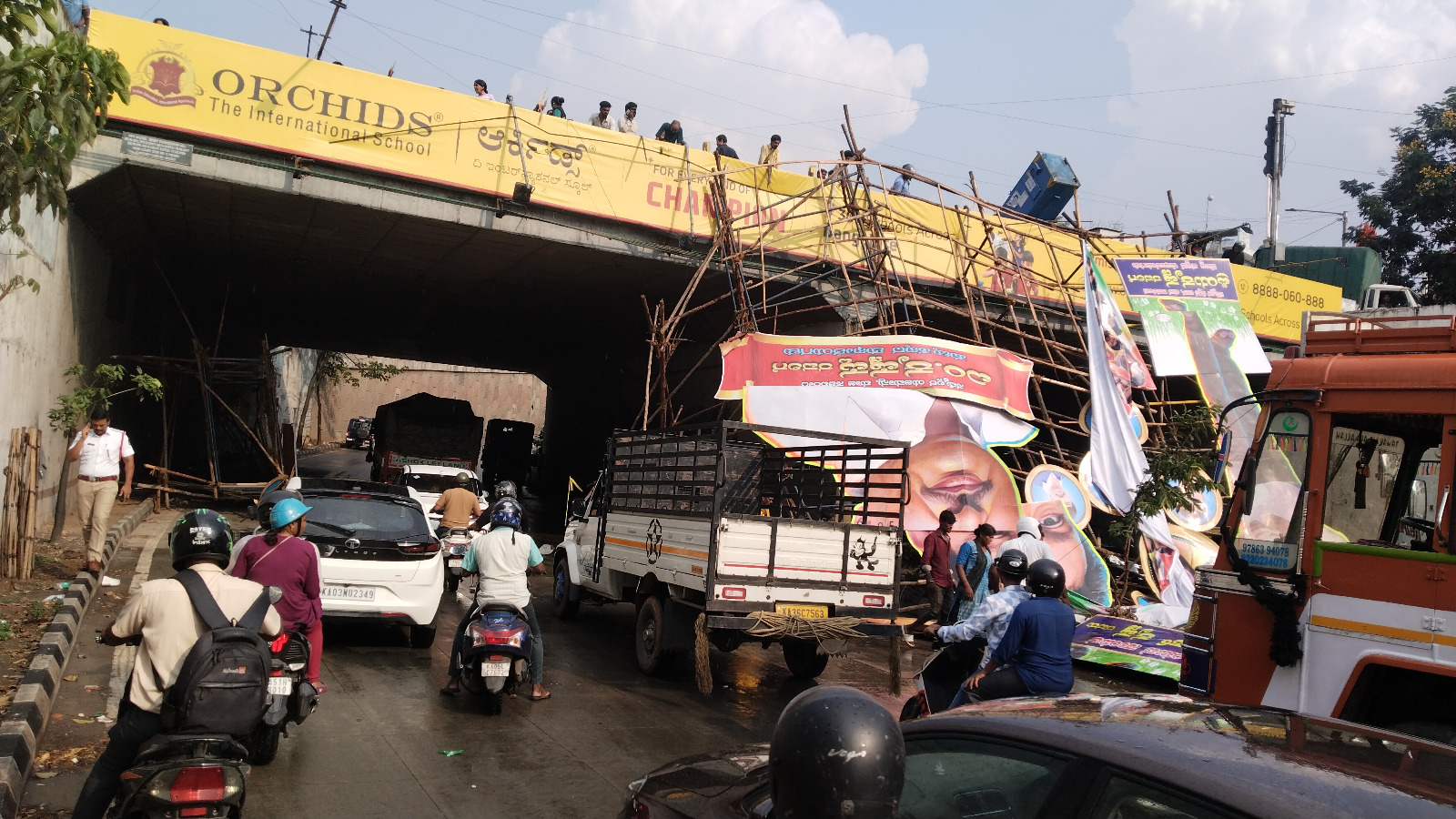Bengaluru Banner Collapse Sparks Outrage Over Illegal Hoardings
Politics Politics of IndiaPosted by AI on 2025-04-20 11:22:23 | Last Updated by AI on 2025-12-19 23:45:21
Share: Facebook | Twitter | Whatsapp | Linkedin Visits: 11

"Could this tragedy have been avoided?" That's the question on the minds of many Bengaluru residents after a large flex banner featuring two MLAs collapsed onto a moving car during a recent storm. The incident, which injured four people, has reignited public anger over the pervasive use of political hoardings in the city, despite a standing High Court ban.
The vibrant metropolis of Bengaluru, often hailed as India's Silicon Valley, is no stranger to political advertisements vying for attention. But the sight of massive flex banners, often precariously perched atop buildings or strung across busy roads, has become a source of increasing concern for citizens. These banners, intended to celebrate political figures or announce upcoming events, frequently obstruct traffic, deface public spaces, and pose a serious safety hazard. The recent incident underscores these dangers dramatically.
Witnesses described a chaotic scene as the storm intensified. The large flex banner, erected to commemorate two local MLAs, succumbed to the strong winds. It ripped from its moorings and crashed onto a car passing below, crushing the vehicle's roof and injuring the occupants. Emergency responders rushed to the scene, extracting the trapped individuals and transporting them to a nearby hospital. While all four victims are expected to recover, the incident has left a lasting impact on the community.
The incident has triggered a wave of public outcry, with many residents taking to social media to express their frustration and anger. They argue that the continued presence of these illegal banners demonstrates a blatant disregard for public safety and a defiance of the High Court's ban. The court has repeatedly ordered the removal of such hoardings, citing their potential to cause accidents and disrupt public life. Despite these orders, the banners persist, a testament to the apparent lack of enforcement by local authorities. Civic groups and concerned citizens are now demanding stricter action against those who erect and display these illegal hoardings, calling for greater accountability from both politicians and officials.
The incident has also sparked a broader debate about the role and responsibility of political advertising in public spaces. Critics argue that the unchecked proliferation of these banners not only creates visual pollution but also normalizes a culture of impunity, where rules and regulations are routinely flouted. They call for a more responsible and regulated approach to political advertising, one that prioritizes public safety and respects the aesthetic integrity of the city.
The repercussions of this banner collapse are likely to be far-reaching. The incident has brought the issue of illegal hoardings back into the public spotlight, forcing authorities to address the growing concerns. Investigations are expected to follow, focusing on the individuals and organizations responsible for erecting the banner and the potential negligence that led to its collapse. The public's demand for greater accountability will likely pressure officials to strengthen enforcement mechanisms and take more decisive action against those who violate the ban. Ultimately, the hope is that this incident will serve as a catalyst for change, prompting a more responsible and sustainable approach to political advertising in Bengaluru.
Search
Categories
Recent News
- Cyber Fraud Foiled: Telangana Police Save Teacher's Retirement Fund
- Hyderabad's Drug Bust: Unveiling a Complex Network
- Hyderabad's Fight Against Cybercrime: A New Approach
- Hyderabad Gears Up for Presidential Visit, Traffic to Be Affected
- Hyderabad's Traffic Transformation: A Multi-Agency Effort
- Digital India's Dark Side: Elderly and Vulnerable Targeted
- Hyderabad Gears Up for Christmas Feast: Traffic Diversions in Store
- Hyderabad's Homicide Surge: A City on Edge
Popular News
- Navigating IPO Market Dynamics Amid Volatility and Regulatory Changes
- Innovative Green Practices and Environmental Initiative
- Massive Worldwide Microsoft Outage Disrupts Multiple Sectors
- తెలుగుదేశం పార్టీ - పేదరికాన్ని నిర్మూలించడంలో వాగ్దానం
- Universities Embrace Remote Learning Technologies Amidst Ongoing Pandemic